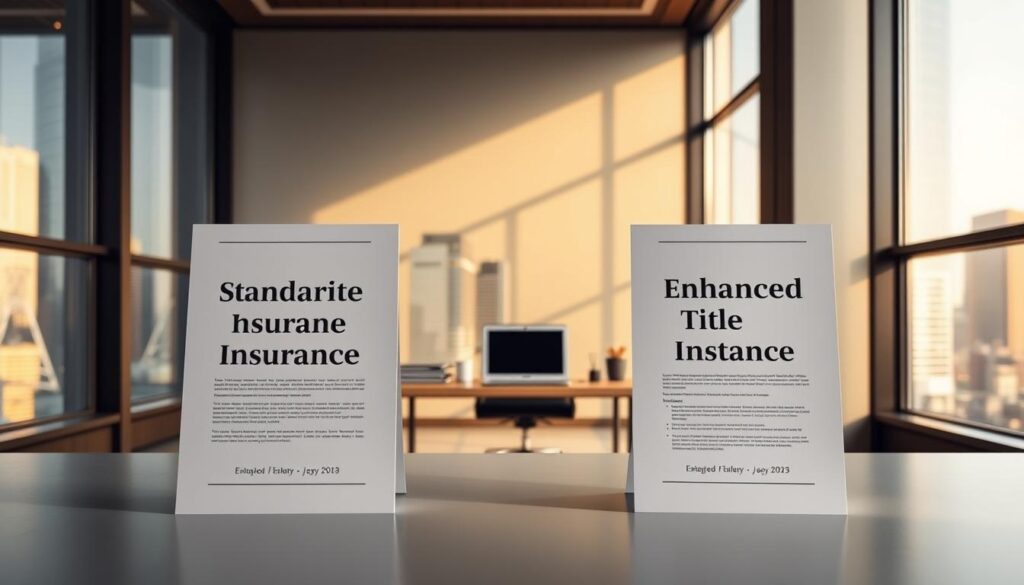For homeowners, securing a property is more than just a financial investment—it’s about peace of mind. Enhanced title insurance offers critical protection against hidden risks that standard policies might miss. This includes undisclosed liens, ownership disputes, and other title defects that could threaten your home’s value.
Unlike traditional coverage, enhanced policies provide 22 additional protections, such as zoning violations and structural damage. These features make it a valuable choice in today’s competitive real estate market. Plus, the one-time premium payment ensures long-term security without recurring costs.
With inflation protection up to 150% of the original coverage, homeowners can feel confident their investment is safeguarded. Whether you’re buying a new property or protecting an existing one, enhanced title insurance is a smart way to ensure your home remains yours.
Key Takeaways
- Enhanced title insurance protects against hidden title defects and post-purchase risks.
- It offers 22 additional protections, including zoning violations and structural damage.
- Available for owner-occupied 1-4 family residences.
- One-time premium payment provides long-term coverage.
- Includes inflation protection up to 150% of the original policy.
What is Enhanced Title Insurance?
Owning a home comes with hidden risks that can disrupt your peace of mind. Expanded protection policies, often referred to as owner policies, go beyond basic coverage to address issues not found in public records. These include unpermitted improvements, boundary disputes, and even violations from previous owners.

To qualify, the insured must be a natural person living in the property as their primary residence. This ensures the policy is tailored to individual homeowners rather than businesses or investors. Unlike standard policies, which focus on recorded liens and tax issues, expanded coverage tackles future claims and undiscoverable problems.
Definition and Purpose
Expanded protection is designed to safeguard homeowners from risks that traditional policies overlook. It includes 22 additional exceptions, such as zoning violations and structural damage. This makes it a valuable choice for those seeking comprehensive security.
How It Differs from Standard Policies
Standard policies cover recorded issues like liens, forgery, and tax obligations. However, they often exclude non-recorded problems, such as boundary disputes or unpermitted improvements. Expanded policies address these gaps, offering broader protection.
| Feature | Standard Policy | Expanded Policy |
|---|---|---|
| Coverage for Recorded Liens | Yes | Yes |
| Protection Against Boundary Disputes | No | Yes |
| Inflation Adjustments | No | Yes |
| Duration of Coverage | Limited | Matches Ownership Period |
Expanded policies also include automatic inflation adjustments, ensuring your coverage keeps pace with rising property values. This feature, combined with extended protection duration, makes it a robust choice for homeowners.
Key Benefits of Enhanced Title Insurance
Protecting your home goes beyond the basics—discover the added security of expanded policies. These plans offer unique advantages that address risks standard options might miss. From inflation adjustments to fraud safeguards, here’s how they provide peace of mind.

Inflation Coverage
One standout feature is the inflation adjustment. Policies include a 10% annual increase in coverage for five years. For example, a $200,000 home could grow to $300,000 in protection. This ensures your policy keeps pace with rising property values.
Building Permit Violation Protection
Unpermitted structures can lead to costly fines. Expanded plans cover violations like unapproved pool additions or illegal ADU removals. These safeguards protect you from unexpected expenses tied to zoning issues.
Coverage for Structural Damage
Encroaching garages or neighbor disputes can threaten your property. These policies cover structural damage caused by such scenarios. They also address issues like boundary disputes, ensuring your home remains intact.
Post-Policy Fraud Protection
Identity theft and forged deeds are growing concerns. Expanded plans include safeguards against post-purchase fraud. This ensures your ownership rights are secure, even if fraudulent activity occurs.
Access and Easement Protections
Shared driveways or pedestrian access rights are often overlooked. These policies ensure your access to essential pathways remains uninterrupted. They also cover disputes over shared spaces, providing clarity and security.
“Expanded policies offer a safety net for risks you might not even know exist.”
With features like these, expanded plans provide comprehensive protection for homeowners. They address both current and future risks, ensuring your investment remains secure. Whether it’s inflation adjustments or fraud safeguards, these policies are designed to protect what matters most—your home.
Enhanced Title Insurance vs. Standard Title Insurance
Choosing the right protection for your property can make all the difference in safeguarding your investment. While standard policies offer basic coverage, expanded plans provide additional safeguards against unforeseen risks. Understanding the differences helps homeowners make informed decisions.

Coverage Comparison
Standard and expanded plans differ significantly in what they cover. A standard policy typically protects against recorded liens, forgery, and tax issues. However, it often excludes non-recorded problems like boundary disputes or unpermitted improvements.
Expanded plans, on the other hand, include 22 additional protections. These cover zoning violations, structural damage, and post-policy fraud. For example, if a neighbor disputes property boundaries, an expanded policy ensures you’re protected.
| Feature | Standard Policy | Expanded Policy |
|---|---|---|
| Recorded Liens | Yes | Yes |
| Boundary Disputes | No | Yes |
| Inflation Adjustments | No | Yes |
| Duration of Coverage | Limited | Matches Ownership Period |
Cost Differences
Expanded plans cost about 10% more than standard ones. For instance, a standard policy might average $4.10 per $1,000 of property value, while an expanded plan could cost $4.92 per $1,000. On a $300,000 home, this translates to a difference of $246.
While the upfront cost is higher, the added protections often justify the expense. For high-value homes or older properties with complex titles, the expanded plan offers better long-term value.
When to Choose Expanded Coverage
Expanded plans are ideal for certain scenarios. Historic homes, for example, often have complicated titles that require broader protection. Similarly, properties in rapidly appreciating markets benefit from inflation adjustments.
If you’re concerned about post-closing issues like permit violations or structural damage, an expanded plan is a wise choice. It’s also recommended for owners who prioritize comprehensive security over minimal coverage.
“Expanded policies address risks that standard plans simply can’t cover.”
Ultimately, the decision depends on your property’s age, value, and your risk tolerance. By weighing the costs and benefits, you can choose the plan that best fits your needs.
Conclusion
Securing your property involves more than just ownership—it’s about safeguarding your future. Expanded policies offer comprehensive protection for high-risk homes and luxury markets. While the premiums may be higher, the long-term benefits often outweigh the costs.
These policies are particularly valuable in areas with frequent boundary disputes or complex structures. Consulting with professionals ensures you choose the right coverage for your needs. Always review Schedule A specifics to understand what’s included.
For long-term ownership security, expanded coverage is a smart investment. Take the next step by comparing quotes and exploring your options. Protect your home and your rights with the right plan today.
FAQ
What is enhanced title insurance?
Enhanced title insurance is a type of policy that offers broader protections compared to standard policies. It covers risks like building permit violations, structural damage, and post-policy fraud, providing additional security for property owners.
How does enhanced title insurance differ from standard policies?
Enhanced policies provide extra protections, such as inflation coverage, access and easement rights, and coverage for zoning violations. Standard policies typically focus on basic ownership and lien issues.
What does inflation coverage in enhanced title insurance mean?
Inflation coverage ensures that the policy’s protection amount increases over time, keeping pace with the property’s rising value. This helps safeguard against potential financial losses.
Does enhanced title insurance cover building permit violations?
Yes, it protects against issues like unauthorized structures or violations related to permits. This ensures compliance with local regulations and avoids costly penalties.
What are access and easement protections in enhanced policies?
These protections ensure that property owners maintain legal access to their land. They cover disputes over rights of way or encroachments that could restrict access.
When should I consider enhanced title insurance?
It’s ideal for high-value properties, homes with unique features, or when additional protections like fraud or zoning coverage are desired. Consulting a professional can help determine if it’s the right choice.
Does enhanced title insurance protect against forgery or fraud?
Yes, it includes post-policy fraud protection, covering issues like forged documents or fraudulent claims that could threaten ownership rights.
Are there cost differences between enhanced and standard policies?
Enhanced policies typically cost more due to their broader coverage. However, the added protections can provide significant long-term value and peace of mind.
